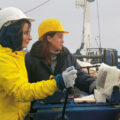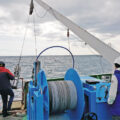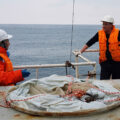Russian students and young scientists took part in the scientific school “Floating University 2023”.
The project enjoys UN support under the framework of the Decade of Ocean Science for Sustainable Development (2021–2030).
The Floating University was launched in 1991 by the Geography Department of the Lomonosov Moscow State University in partnership with UNESCO. Since then, participants of the Moscow State University Floating University have made dozens of discoveries relating to mud volcanoes, landslide processes and hydrothermal vents. The Floating University can boast 18 international expeditions to the Black and Mediterranean seas, the North Atlantic and the Arctic, important discoveries in marine geology and biology, and unique expertise in preparing highly qualified marine researchers.
“The Floating University is driven by the national project “Sciences and Universities”. Expeditions on board research vessels let future ocean researchers, biologists and chemists gain practical experience and find their way in science. Our priority is to prepare researchers. The program is open to all participants regardless of their education and aims to draw attention to ocean sciences and explain what makes a career in this field exciting,” says Andrey Omelchuk, Deputy Minister of Science and Higher Education of Russia.
This year’s event attracted 1,130 participants from 82 Russian cities. The Floating University schools worked on the premises of nine educational institutions: the Moscow Institute of Physics and Technology in partnership with the Shirshov Institute of Oceanology of the Russian Academy of Sciences, Moscow; the Lomonosov Moscow State University and the Institute of Physics of the Earth of the Moscow Academy of Sciences, Moscow; the Higher School of Economics, Moscow; the Saint Petersburg State University, St. Petersburg; the Astrakhan State University, Astrakhan; the Far Eastern Federal University, Vladivostok; the Immanuel Kant Baltic Federal University, Kaliningrad; the Marine Hydrophysical Institute of the Russian Academy of Sciences, the Federal Research Center — the Alexander Kovalevsky Institute of Biology of the Southern Seas of the Russian Academy of Sciences, Sevastopol; the Southern Scientific Center of the Russian Academy of Sciences, Rostov-on-Don.
For three days the participants attended lectures and took part in workshops in different fields of oceanography: physics and chemistry of the ocean, ocean research from space, ocean-atmosphere interactions, climate change, geology and geophysics, offshore exploration and production of mineral resources, marine biology and ecology, ocean data processing and visualization, numerical ocean modeling, oceanographic tools, dangerous natural phenomena, marine exploitation and economy, marine heritage, archeology.
This year the Higher School of Economics joined for the first time with a program aimed to boost science communication and popularization skills. Apart from educational activities, the students took part in debates, studied research labs and visited specialized museums. The participating institutions strove to help students choose their specialty and field of research.
The Floating University is over 30 years old. The project is supported by the Ministry of Science and Higher Education of Russia and coordinated by the Moscow Institute of Physics and Technology under the framework of the national project “Science and Universities”. The program also enjoys UN support under the framework of the Decade of Ocean Science for Sustainable Development (2021–2030).
The national project “Science and Universities” aims to draw gifted young people to science, encourage the professional community’s involvement in seeking effective solutions for strategically important scientific issues, and raise public awareness of breakthroughs made by Russian scientists with the support of the state, scientific community and business. As dictated by the national project, Russia should become one of the top five countries driving R&D in areas defined by the scientific and technological priorities.
Source: minobrnauki.gov.ru and pu.ocean.ru.
Photos courtesy of the press office of the Federal Research Center — the Alexander Kovalevsky Institute of Biology of the Southern Seas




